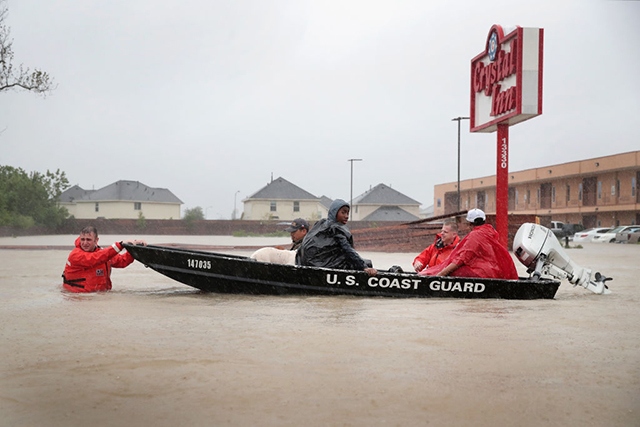
Truthout is an indispensable resource for activists, movement leaders and workers everywhere. Please make this work possible with a quick donation.
This article was published by TalkPoverty.org.
On Monday, President Donald Trump was asked point-blank whether he supports cutting the Federal Emergency Management Agency’s (FEMA) budget in the aftermath of Hurricane Harvey. His response: “No.”
Left unmentioned was the fact that, earlier this spring, the president of the United States called for historic cuts to FEMA’s budget. Trump’s 2018 budget blueprint proposed more than $1 billion in cuts to FEMA — 11 percent of its total footprint. The proposal would make major cuts to six FEMA grants, including its two largest for preparing for and responding to emergencies. It would also entirely eliminate four grants, including funding for emergency food and shelter and training for first responders.
The administration’s rationale is that FEMA funding cuts are needed to pay for its immigration enforcement and mass deportation efforts — along with Trump’s proposal to build a wall along the southern border. All told, Trump wants to shift $5 billion within the Department of Homeland Security, where FEMA is housed, to Customs and Border Protection and Immigration and Customs Enforcement.
FEMA is not Trump’s only target for cuts when it comes to disaster preparedness. The budget also takes an axe to the US Coast Guard (unusual given the administration’s support for increased US military spending), which has already rescued dozens from the floodwaters in Texas. The budget cuts a whopping $1.2 billion from the Coast Guard’s approximately $9 billion budget.
The administration is so focused on deportation that it is neglecting real national security risks
And despite promises to invest in the country’s infrastructure, Trump’s budget slashes the investments that are critical for disaster preparedness. He would immediately eliminate the Transportation Investment Generating Economic Recovery grant, which, among other things, helped Florida build a new hurricane evacuation route in the Everglades. His cuts to the Highway Trust Fund would starve the country’s highway infrastructure of nearly $100 billion — and put more than 97,000 jobs at risk in Texas alone. Just last week, Trump announced the rollback of an Obama administration order that new infrastructure projects be designed to survive rising sea levels and climate change (FEMA was in the process of soliciting public comment).
The impact of these cuts will not be felt equally. Cuts to emergency preparedness — like the natural disasters themselves — fall particularly hard on the most vulnerable. Communities of color are the most likely to live in neighborhoods that are at risk of flooding. They’re also more likely to live near the petrochemical plants that could discharge toxic substances during the hurricane. According to social vulnerability maps, seniors, people with disabilities, immigrants, and people in poverty are all more likely to live in neighborhoods most affected by Hurricane Harvey.
The irony is that the administration is so focused on mass deportation and building a wall that it is openly neglecting real national security risks. FEMA and the US Coast Guard not only respond to natural disasters and protect vulnerable populations; they also respond to terrorist attacks. As with so many other policies, Donald Trump is so focused on chasing his white whale that he’s ignoring the core functions of government.
Editor’s note: The Center for American Progress has launched a coalition of over 20 groups united in pushing back against any cuts to health care, disability benefits, nutrition assistance, and other basic living standards in the upcoming congressional budgets. Learn how you can get involved here.
A terrifying moment. We appeal for your support.
In the last weeks, we have witnessed an authoritarian assault on communities in Minnesota and across the nation.
The need for truthful, grassroots reporting is urgent at this cataclysmic historical moment. Yet, Trump-aligned billionaires and other allies have taken over many legacy media outlets — the culmination of a decades-long campaign to place control of the narrative into the hands of the political right.
We refuse to let Trump’s blatant propaganda machine go unchecked. Untethered to corporate ownership or advertisers, Truthout remains fearless in our reporting and our determination to use journalism as a tool for justice.
But we need your help just to fund our basic expenses. Over 80 percent of Truthout’s funding comes from small individual donations from our community of readers, and over a third of our total budget is supported by recurring monthly donors.
Truthout’s fundraiser ended last night, and we fell just short of our goal. But your support still matters immensely. Whether you can make a small monthly donation or a larger one-time gift, Truthout only works with your help.